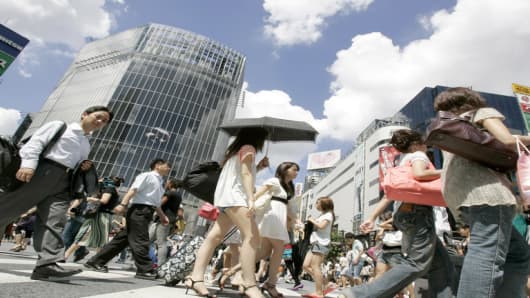Japan's factory output unexpectedly dipped in February and a fourth consecutive drop in core consumer prices underscored the challenges the central bank faces in engineering economic recovery and achieving its 2 percent inflation target.
Industrial output eased 0.1 percent last month, defying expectations for a rise, while core consumer prices fell 0.3 percent from a year earlier, strengthening the case for further Bank of Japan monetary stimulus at its policy review next week.
The BOJ is likely to start open-ended asset purchases immediately rather than in 2014 and consider setting a new target to buy longer-dated bonds, sources say, in a show of its resolve to beat nearly two decades of deflation.
New BOJ Governor Haruhiko Kuroda has set an ambitious target of achieving the central bank's 2 percent inflation target in two years, but has said it will not be easy even as the economy heads for a recovery.
"It will take about six months for a weaker yen to be felt in exports, while overseas economies including China have not yet gained momentum in their recovery," said Takeshi Minami, chief economist at Norinchukin Research Institute in Tokyo.
(Read More: BOJ's Kuroda Says Asset Purchase Limit Already Broken)
The drop in output compared with a median market forecast of a 2.6 percent increase, the data from the Ministry of Economy, Trade and Industry showed on Friday.
But in a sign that it was likely to be a blip in Japan's gradual recovery from last year's shallow recession, manufacturers surveyed by the ministry expect output to rise 1.0 percent in March and 0.6 percent in April, as carmakers increase production due to a recovery in overseas demand.
(Read More: Ssshh! Why Japan is Keeping Quiet on the Yen)
In another encouraging sign, the Markit/JMMA Japan Manufacturing Purchasing Managers survey showed overall manufacturing activity growing in March for the first time in 10 months.
Separate data from the Internal Affairs ministry showed core consumer prices, which exclude fresh food but include energy costs, fell 0.3 percent in February from a year earlier, a fourth straight month of declines. That was a slightly smaller fall than a median market forecast of a 0.4 percent drop.
March data for the Tokyo area, available a month earlier than nationwide data, showed the trend extending with core prices slipping 0.5 percent.
(Read More: Japan Exports Fall but Firms' Mood Improves Amid Recovery Hopes)
However, declines in consumer prices are likely to slow in coming months as a weak yen pushes up the cost of energy imports and as fiscal spending narrows the output gap, economists say.
Japan has been mired in mild deflation for almost two decades, and Prime Minister Shinzo Abe has made economic revival and escape from deflation top priorities.


